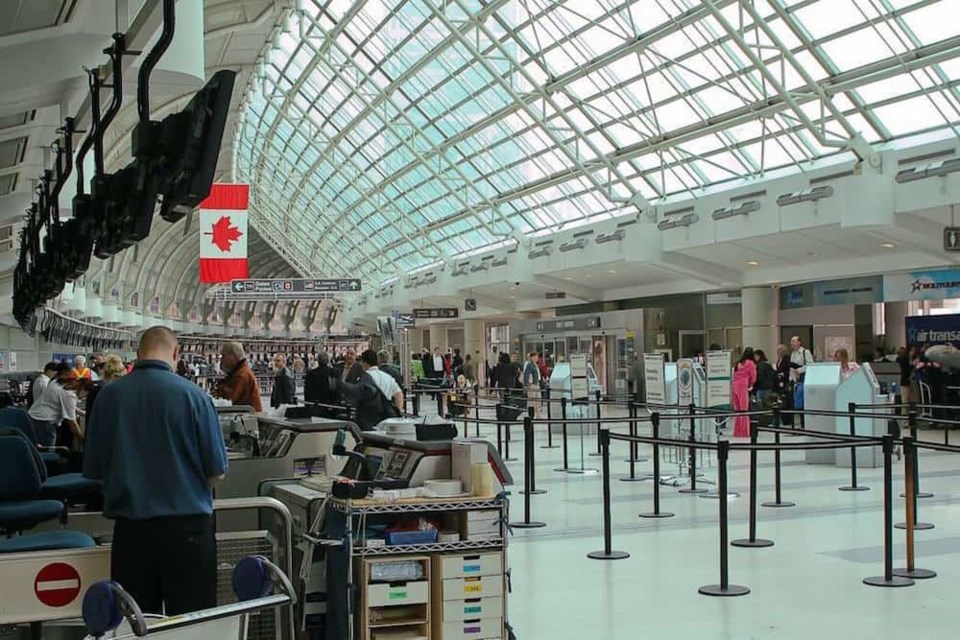The Government of Canada announced Wednesday that all travellers are now required to provide specific information upon and after entry to the country.
According to a federal news release, travellers will need to provide a quarantine plan and contact and travel information as part of ongoing efforts to reduce the spread of COVID-19.
Back in April, the Government of Canada introduced ArriveCAN to create a secure and user-friendly way to help travellers comply with these border measures. ArriveCAN is available as a mobile app or by signing in online.
Pre-arrival to Canada
As of Nov. 21, air travellers whose final destination is Canada must submit their information electronically through ArriveCAN before they board their flight. This includes travel and contact information, quarantine plan (unless exempted under conditions set out in the Mandatory Isolation Order), and COVID-19 symptom self-assessment.
Travellers must be ready to show their ArriveCAN receipt when seeking entry into Canada; a border services officer will verify that they have submitted their information digitally.
Travellers who do not submit the required information digitally before boarding their flight could be subject to enforcement action, which can range from verbal warnings to a $1,000 fine. However, exceptions will be made for those unable to submit documents electronically "due to personal circumstances, such as a disability or inadequate infrastructure."
Starting on Nov. 4, travellers can expect to be reminded by their air carrier of the need to submit COVID-related information digitally through ArriveCAN before boarding their flight to Canada.
Starting now, travellers entering Canada by land or marine modes are strongly encouraged to continue ArriveCAN by downloading the mobile app or signing in online to provide the mandatory information before they arrive to avoid additional delays for public health questioning and to limit points of contact at the border.
Travellers can show their ArriveCAN receipt to a border services officer when seeking entry into Canada.
Post-entry to Canada
As of Nov. 21, travellers who enter Canada by air, land or marine modes, unless exempted under conditions set out in the Mandatory Isolation Order, will also be required to submit information through ArriveCAN or by calling the 1-833-641-0343 toll-free number during their quarantine or isolation period. Within 48 hours of entering Canada, travellers must confirm they have arrived at their place of quarantine or isolation and those in quarantine must complete a daily COVID-19 symptom self-assessment during their quarantine period.
Travellers who don’t use ArriveCAN to submit their information before entering Canada will be required to call the 1-833-641-0343 toll-free number daily throughout their quarantine or isolation period to provide their post-border information. They will not be able to revert to using ArriveCAN.
Travellers who do not submit the mandatory information required after they have crossed the border will be considered a high priority for follow-up by law enforcement.
The ArriveCAN app is available for download on Google Play for Android or through the App Store for iOS. Travellers can also submit their information by signing in online.
Quick Facts
- In-transit passengers whose final destination is not Canada do not need to submit their information through ArriveCAN.
- Travellers who may experience difficulty submitting their information through ArriveCAN can access additional information at Canada.ca/ArriveCAN or send an email to [email protected].
- Exceptions will be made for those who are unable to submit documents electronically due to personal circumstances, such as a disability or inadequate infrastructure.
- Dedicated lanes for faster processing for ArriveCAN users are available at some major international airports, including Vancouver International Airport, Calgary International Airport, Toronto Pearson International Airport, and the Montréal Pierre-Elliott Trudeau International Airport.
- ArriveCAN does not use any technology or data, such as GPS, to monitor or track traveller movements. Your privacy is protected.
- The Government of Canada is taking a variety of measures at the border as part of its efforts to reduce the spread of COVID-19 in Canada. Current travel restrictions remain in place. The Government of Canada continues to advise Canadians to avoid non-essential travel outside of Canada. Canada's official global travel advisory, cruise ship advisory and pandemic COVID-19 travel health notices are still in effect.




